Donald Trump
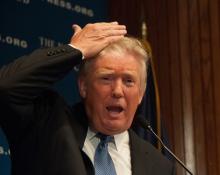
A reporter asked Pope Francis, "Can a good catholic vote for this man [Trump]?" And Francis answered honestly.
“A person who thinks only about building walls, wherever they may be, and not building bridges, is not Christian," said Francis.
Although Francis did not directly refer to Trump, his implication is fairly clear, and strong.

"To use anger politically, especially by turning people against other people, is one of the worst sins in politics, and both Cruz and Trump are doing that."

Jimmy Kimmel recently hosted Jesus on his late show. Not real Jesus, of course. (Don’t worry, this isn’t the apocalypse. You haven’t been left behind). It’s just pretend white Jesus.
Kimmel’s team took real quotes from various presidential candidates and let an actor pretending to be Jesus read them as if he were running for president. And yes, they did happen to include quotes from Donald Trump.
“We want[ed] to get an idea of what [these statements] would actually sound like from the mouth of Jesus,” said Kimmel.
It’s quite disturbing, really.
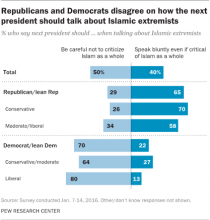
Republicans and Democrats divide sharply over views on Islam, Muslims, and how a U.S. president should label violent extremists. But Americans overall agree there’s a “a lot” of discrimination against Muslims living in the United States — and it’s rising — a new Pew Research survey finds.

Donald Trump, who loves to call others “losers,” is a big one himself in a new survey of U.S. Protestant pastors.
When LifeWay Research, an evangelical polling group, asked Republican pastors in mid-January who their pick would be if they were voting that very day, Trump was named by only 5 percent.
“Undecided” was the big winner with more than a third of GOP pastors (39 percent) in the survey. Indeed, 48 percent overall said they had no top choice in this “bizarre election season,” said LifeWay Research executive director Ed Stetzer.
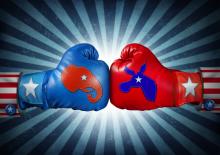
The culture wars have always been with us. Conservatives start them. And liberals win them. So argues Stephen Prothero in his new book Why Liberals Win the Culture Wars (Even When They Lose Elections).
Prothero recently spoke with Sojourners about this argument, its impact on liberal activism, and how we can better wage the culture wars. This interview has been edited for length and clarity.
1. WATCH: America and the Impact of Racial Geography
“Race is in the air we breathe and in the water we drink in Flint … I don’t think if it was 8,000 white kids this would’ve happened." —Jim Wallis visited MSNBC’s Morning Joe to discuss race and the crisis in Flint. Read more in his new book: http://bit.ly/23f5Vlu
2. As Historic Blizzard Bears Down on East Coast, Concerns for Homeless
The Sojourners offices are closed today as we prepare for this weekend’s blizzard. Join us in prayer for the city’s homeless — and those throughout the path of the storm.
3. Flint Was Forgotten Before It Was Poisoned
“They are among America’s forgotten cities—wracked with pervasive poverty and violent crime—populated by a forgotten people. Mostly black and brown, they have little voice over their own destiny. There are no finely suited Washington lobbyists pressing their interests. Presidential candidates rarely come to places like these and they almost never make the national news unless something really bad happens.”

“The ultimate tragedy is not the oppression and cruelty by the bad people but the silence over that by the good people.”-Martin Luther King Jr.
This week at Liberty University, Donald Trump was given a platform to address evangelicals. Much has been written on why Donald Trump is patently unqualified to be speaking on a day where we celebrate the lasting impact of Martin Luther King Jr.’s fight against oppression. His racist and xenophobic policy proposals include mass deportations, barring Muslims from travelling to the United States, and creating a registry to monitor Muslims in America. Lending legitimacy to him is entirely contradictory to the life and mission of Martin Luther King Jr.

Trump held his audience spellbound for the first part of his message, which included a reference to Jesus turning over the voter registration tables in the temple, but then he invoked a scripture from the second book of Corinthians. “Two Corinthians 3:17, that’s the whole ballgame.”
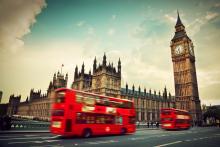
Britain’s Parliament held a boisterous debate Jan. 18 on a proposal to ban Donald Trump from the country in a rebuke of his call to block Muslims from entering the United States. The topic drew plenty of support from the British lawmakers, who don’t actually have the power ban anyone. The debate did allow members of Parliament to vent their frustrations about Trump’s comments.
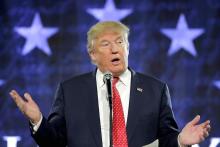
Just weeks before the Iowa caucus, GOP presidential contender Donald Trump is aiming his proudly “politically incorrect” anger and his pledge to be “great!” directly at evangelical Christians. “I’m going to protect Christians,” who are losing their power in American society, he said Jan. 18, addressing 100,000 Liberty University students — packed in the Lynchburg, Va., campus sports arena or viewing online.

As Donald Trump continues to dominate media that try to balance a fascination for celebrities with a duty to check facts claimed by public figures of all stripes, some critics of the GOP presidential frontrunner may recall 18th century novelist Oliver Goldsmith’s line, “The loud voice that spoke the empty mind.” But a more apt thought may come from the classic 1983 movie “A Christmas Story” (airing on Turner cable networks dozens of times this week).
Remember Ralphie noticing the neighborhood bully?

It’s one of the most intriguing sub-plots of the 2016 election: Why are evangelicals, who historically have supported immigration reform and a path to citizenship for deeply felt religious and moral reasons, gravitating towards the two candidates who are most hostile to policy changes that would accommodate and integrate undocumented immigrants into American life?
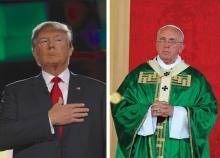
Americans’ most admired man and woman in the world are — once again — President Barack Obama and former Secretary of State Hillary Clinton.
But the shocker in the Gallup Poll’s Most Admired List released Monday may be the No. 2 spot in the survey, where Donald Trump tied Pope Francis in the year the pontiff visited this country for the first time.
U.S. service members are using the hashtag #IWillProtectYou to show support for a young Muslim girl who believed her family would be forced to flee following Donald Trump’s call to ban Muslims from the country.

Speakers at the rally included representatives of the Islamic and Christian communities, the National Organization for Women, Code Pink, and Ghada Mukhdad, a Syrian refugee and member of the Syrian Civil Coalition which, according to their website, is a “lobby of Syrian civil society organizations, activists, and initiatives” that seeks to address “the increasing gap between the needs and priorities of the Syrian society on one hand and those making decisions concerning Syria.”
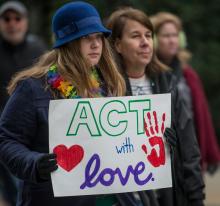
Since the Republican presidential front-runner announced after San Bernardino that he would close America’s borders to Muslims, a debate has ensued about what “radicalization” means and how far we as a nation are willing to go to protect ourselves from it. So-called liberals (and even some in the Republican party’s mainstream) have said, “Not all Muslims have been radicalized.” To this Donald Trump retorts, “Until we know which ones have been, let’s keep them all out.” The unquestioned consensus in America’s public square is that we can only be safe by figuring out who the un-American terrorists are and getting rid of them.
But where we're from in North Carolina, we should not be so naïve. We have a disproportionate share of homegrown terrorists.
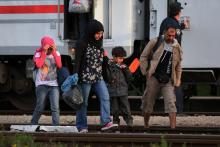
If Donald Trump had been Pharaoh of Egypt, the Holy Family never would have escaped from Herod’s persecution. Jews would have been prohibited from entering the country. Christmas features the story of a family from the Middle East leaving a homeland in fear and seeking refuge is a foreign land, just as millions do today.
If you visit Egypt and its ancient Coptic Church, you’ll see images of the Holy Family everywhere: Joseph, Mary — always on a donkey — and the infant Jesus. They are moving, wandering. You’ll find pictures of them passing by the pyramids. Egyptian Christians treasure this story for theirs is the land that offered welcome and hospitality to the Son of God when he was a refugee.

America stands at one side of a bridge right now as a white majority nation — on the other side, a country comprising a majority of minorities. This change is inevitable, but how our nation responds to it is currently unclear.
Are we headed for more conflict as too many in the shrinking white population try desperately to cling to the past? Or can we cross this bridge to a new America where we begin to see the "beloved community" that Dr. King envisioned?
On Jan. 19, the day after our country commemorates Dr. Martin Luther King Jr. Day, my new book, America's Original Sin: Racism, White Privilege, and the Bridge to a New America, will be released. As members of our Sojourners community and readers of my weekly column, I wanted you to be among the first to watch this preview.
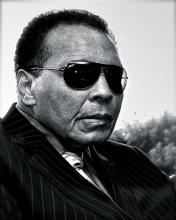
Muhammad Ali aimed a powerful and impassioned message at Republican presidential candidate Donald Trump on Dec. 9, saying that the recent global terrorism crisis has “perverted people’s views on what Islam really is.”
Ali became a Muslim and changed his name from Cassius Clay during the height of his career as one of the greatest boxers in history. His message came in a statement following a week in which Trump cast doubt on President Barack Obama’s assertion that several American “sporting heroes” practiced Islam.
“I am a Muslim, and there is nothing Islamic about killing innocent people in Paris, San Bernardino, or anywhere else in the world,” Ali said.